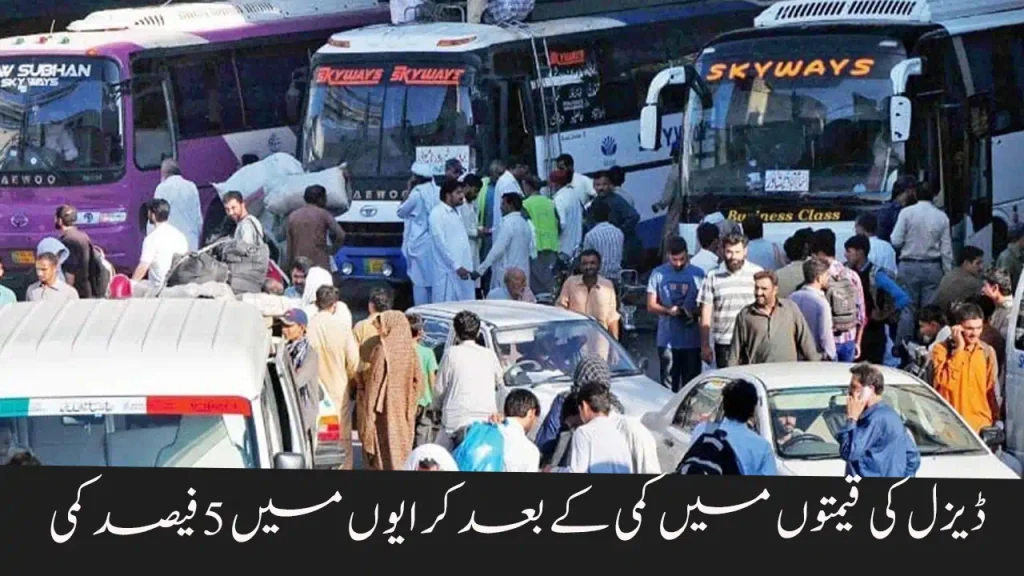Punjab Transport Cuts Fares by 5% After Diesel Price Reduction

The Punjab Transport Department has officially announced a 5% reduction in intercity transport fares following the recent decrease in petroleum product prices. This decision comes as a relief for thousands of passengers who regularly travel between major cities, as it directly lowers their travel costs.
The step was taken after diesel prices fell by Rs. 12.84 per liter, significantly lowering the operational expenses of transport companies. Since diesel is the primary fuel used in long-distance buses, the government directed transporters to adjust fares accordingly.
Why the Fare Reduction Matters
Transportation costs have a direct effect on people’s daily lives. When fuel prices go up, passengers are often burdened with higher fares. By the same logic, when fuel prices drop, commuters expect relief. This 5% reduction in fares is a way to ensure fairness and transparency in the system.
For many families, especially those who frequently travel for work, education, or personal commitments, even a small reduction in travel expenses can make a noticeable difference.
Updated Fares on Major Routes
Here is a detailed list of the newly adjusted fares on popular intercity routes from Lahore:
- Lahore to Sargodha: Reduced by Rs. 50 → Now Rs. 1,060
- Lahore to Islamabad: Reduced by Rs. 100 → Now Rs. 1,950
- Lahore to Peshawar: Reduced by Rs. 120 → Now Rs. 2,380
- Lahore to Rahim Yar Khan: Reduced by Rs. 140 → Now Rs. 2,810
- Lahore to Hyderabad: Reduced by Rs. 300 → Now Rs. 5,800
- Lahore to Karachi: Reduced by Rs. 320 → Now Rs. 6,040
These fare cuts apply to all bus operators under the Regional Transport Authorities (RTAs), ensuring uniformity and fairness across Punjab.
How Passengers Benefit
The decision has several direct benefits for commuters:
- Affordable Travel → Lower fares reduce the overall cost of long-distance journeys.
- Fair Adjustment → Passengers enjoy immediate relief when fuel prices drop, instead of only bearing the burden when prices rise.
- Encourages Public Transport → With reduced fares, more people may opt for buses over private cars, helping reduce traffic congestion and fuel consumption.
- Transparency in Policy → The fare adjustment builds trust between passengers, transport companies, and government authorities.
Passenger Reactions
Initial feedback from passengers has been positive and welcoming. Many travelers expressed that while the fare cuts may seem small, they add up, especially for frequent travelers. A passenger traveling from Lahore to Islamabad, for example, saves Rs. 200 on a round trip. Over the course of a month, this can translate into significant savings.
Transport companies, on the other hand, have also supported the move, as the adjustment is based on official calculations rather than arbitrary reductions.
Frequently Asked Questions (FAQs)
Why was only a 5% reduction announced?
The fare adjustment is directly linked to the Rs. 12.84 drop in diesel prices. Transport costs are calculated as a percentage of fuel prices, and 5% was considered a fair cut.
Will fares go up again if fuel prices increase?
Yes, fares are subject to change depending on petroleum price fluctuations. If fuel costs rise in the future, transport fares may also be revised upward.
Who decides the fare adjustments?
The Punjab Transport Department, through Regional Transport Authorities (RTAs), regulates and enforces fare structures.
Does this apply to local buses inside the city as well?
The decision mainly applies to intercity routes. However, in some cases, local transport fares may also be adjusted when fuel prices change significantly.
Do all transport companies have to follow this decision?
Do all transport companies have to follow this decision?
Broader Impact on Travel and Economy
The reduction in fares is not just about saving money for passengers. It also has wider economic and social benefits:
- Encourages affordable mobility for students, workers, and families.
- Reduces pressure on households already facing inflation in other sectors.
- Promotes the use of public transport over private vehicles, which can lower fuel demand and reduce traffic congestion.
- Sets a transparent standard where the public directly benefits from government fuel price policies.
Conclusion
The Punjab Transport Department’s decision to cut intercity fares by 5% is a welcome relief for passengers and a sign of fair governance. By ensuring that lower diesel prices translate into reduced transport costs, the government has shown a commitment to easing the burden on commuters.
For travelers, this means more affordable journeys across Punjab, from short trips to nearby cities to long-distance travel to Karachi or Hyderabad. This measure highlights the importance of passenger-friendly policies that reflect real economic changes.
In the long run, such decisions can encourage more people to use public transport, strengthen trust between passengers and transport authorities, and contribute to a more balanced and sustainable transport system in the province.
Read this: Gold Prices Drop in Pakistan and Global Markets | Silver Remains Steady
Read this: FESCO Introduces Apna Meter Apni Reading to End Overbilling






